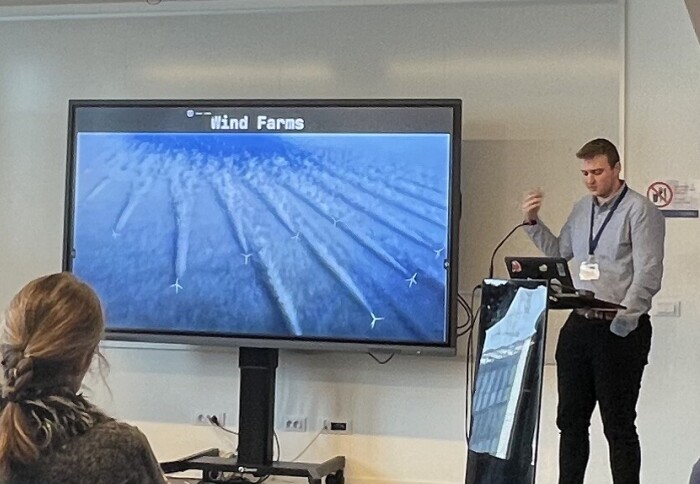Imperial researcher wins national presentation prize for turbulence research
by Ayesha Khan

Research Associate, Andrew Mole, won first prize for his presentation on wind turbine adjustments for increased power production.
Dr Andrew Mole, Research Associate within the Department of Aeronautics, has been recognised for his work in pushing forward wind energy research at the UK Turbulence Consortium annual meeting.
Using cutting-edge AI and computational methods, Andrew presented an innovative approach aimed at maximising power generation from wind farms, a critical step in transitioning away from fossil fuels.
As wind travels through wind turbines, it leaves behind a turbulent ‘wake’, causing reduction in wind speed. This turbulence adversely impacts nearby turbines, diminishing their performance.
To combat this issue, Andrew utilised ‘wake steering’ - a technique that strategically adjusts the orientation of turbines to minimise the impact of wakes on neighbouring turbines. Optimising turbine angles, using advanced computational methods, will allow for increased efficiency of wind farms.
Traditionally, investigating such optimisations relied on simplified models, which often led to suboptimal solutions due to their lack of detail. Andrew’s approach, combines these with large eddy simulation (LES) and Bayesian optimisation (BO), resulting in multi-fidelity Bayesian optimisation (MF-BO). This sophisticated technique intelligently selects the most informative experiments to optimise windfarm configurations for increased power output, whilst minimising computational costs.
On his research Dr Andrew Mole said: 'What we're doing in combining AI with high-fidelity turbulence simulations is really exciting! I'm looking forward to continuing this work to increase the efficiency of wind farms and to generate more clean energy."
Initial tests, using a three-turbine setup, have yielded promising results, paving the way for a greener and more sustainable future.
The UK Turbulence Consortium, comprising academics and researchers from 30 UK institutions, underscores the commitment to advancing world-leading turbulence simulation and scientific research. Through collaborative efforts they aim to use high performance computing to investigate aspects of turbulence using numerical simulations.
Andrew’s research is part of Imperial’s AI for Net Zero project, which looks to integrate Digital Twin technology into various AI projects focused on wind, transport and utilities.
Article text (excluding photos or graphics) © Imperial College London.
Photos and graphics subject to third party copyright used with permission or © Imperial College London.
Reporter
Ayesha Khan
Department of Aeronautics